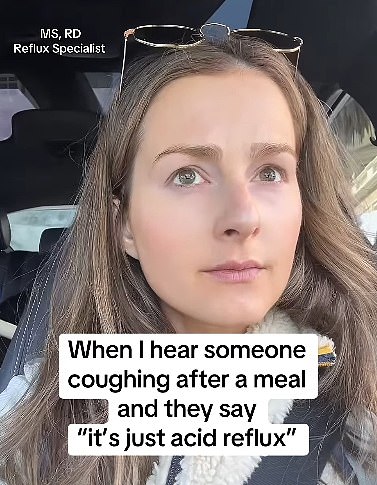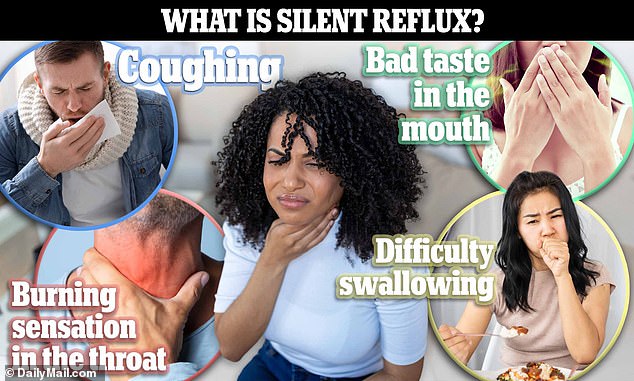Watch Out: A Common Eating Symptom Could Signal Risk of Deadly Cancer, Says Diet Expert
- EXPLORE FURTHER: Researchers identify fresh reason behind cancer affecting 10,000 annually
A dietitian has urged the public to seek help if they find themselves coughing after a meal — as it could be a sign of a condition that can dramatically increase the risk of deadly cancer .
Coughing after eating is an uncommon sign of various conditions. 'Silent reflux,' which occurs when stomach acid flows backward toward the throat or even the lungs, leading to irritation.
In contrast to the typical version of acid reflux, this silent variant often lacks the usual burning feeling.
Rather, it involves regular throat clearing, coughing post-meals, vocalhoarseness, and feeling like there’s something stuck in your throat.
Now, Molly Pelletier, an expert in nutrition, has taken to Instagram to warn of the dangers of leaving the little-known condition untreated.
In a video That has now been watched more than 8.6 million times, she advised patients not to overlook a persistent cough as merely "acid reflux."
'She mentioned that your throat is attempting to shield itself from harm,' she explained.
Quiet reflux, also called laryngopharyngeal reflux (LPR) in medical terms, is believed to impact approximately One out of every four individuals in the UK usually experiences this condition where stomach acid moves higher up into the food pipe, reaching as far as the throat beyond what occurs with typical acid reflux.

Research indicates that enduring acid reflux over numerous years may elevate the chances of developing throat, esophageal, and thyroid cancers. at least two-fold .
It is believed that the continuous exposure to stomach acid in the throat may irritate the cells lining this area, potentially causing mutations that initiate the development of cancerous growths.
Research has indicated that approximately 28 percent of individuals diagnosed with laryngeal cancer experienced acid reflux.
Ms Pelletier clarified: "When acid inflames your larynx [voice box], it activates your body's innate protection mechanism: the cough reflex."
Ms Pelletier recommended attempting to steer clear of too much throat clearing, as this could cause additional irritation to the throat lining.
Steering clear of food intake two to three hours prior to sleeping, cutting down on acidic dishes, and managing stress levels can likewise help reduce symptoms and consequently lower the risk of cancer.
'Focus on calm, unhurried meals and chewing food well,' the expert advised.
In addition to acidic foods such as citrus fruits, vinegar, and tomatoes, the dietitian suggested cutting back on fizzy beverages.

This occurs as carbonated beverages may lead to bloating in the abdominal area, exerting pressure on the muscular valves.
These factors may elevate the acid levels in the stomach, thereby boosting the likelihood of reflux.
Drinking excessive amounts of alcohol and coffee can lead to acid reflux as well.
Based on information from the Cleveland Clinic, at least half of individuals reporting persistent hoarseness suffer from LRP, also known as 'quiet' reflux.
Gastro-oesophageal reflux occurs when stomach acid flows back up into the oesophagus —the tube linking your mouth with your stomach—causing irritation to sensitive tissues.
This occurs because the muscle valve at the upper part of the stomach, typically responsible for closing and stopping food and gastric fluids from coming back up, isn't functioning correctly.
Although common heartburn can happen anytime during the day, typically following meals, silent reflux often takes place at night.
T The condition can be challenging to identify due to the symptoms resembling those of other ailments like chest infections and allergies.
Other frequent symptoms involve the sensation of excess phlegm accumulating in the throat and an abundance of belching.
Physicians identify this quiet ailment by employing a camera to examine a patient’s throat and voice box, typically finding them swollen.
The treatment typically includes making lifestyle adjustments such as reducing alcohol intake and stopping smoking, using antacid medications to decrease stomach acidity, and sometimes undergoing surgery to strengthen the valve.
Antacids like Gaviscon and Rennie function by creating a barrier, often referred to as a 'raft,' above your stomach contents. This way, should any substance escape upwards towards your esophagus, it will be less harmful.
Less commonly, individuals might be directed to see a specialist in digestive disorders, specifically when physicians worry that these quiet signs could escalate into significant medical concerns.
The NHS recommends that individuals experiencing symptoms which do not get better within three weeks should reach out to their GP for guidance.
Read more
Post a Comment for "Watch Out: A Common Eating Symptom Could Signal Risk of Deadly Cancer, Says Diet Expert"